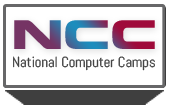Computers Are For Kids
The first computer camp was conducted in 1977 by Dr. Michael Zabinski, Professor of Engineering and Physics at Fairfield University. At that time he coined the phrase “computer camp” and organized National Computer Camps (www.NCCamp.com). The first NCC was held in Orange Connecticut and since then computer camp has come a long way. Once the refuge of geeky youngsters avoiding fun in the sun, computer camp is now not only an enjoyable mainstream summer activity but can also be an important educational boost for kids who get little computer instruction at school or home.
The need for good computer instruction has grown in parallel to the widespread use of personal computers. Like a musical instrument or a sport – where kids often use the summer months to build expertise – computer camps have joined the extracurricular wish lists of many kids.
The number of computer camps has grown in recent years illustrating the general push to make kids more competitive in the Information Age. This summer Zabinski will conduct National Computer Camps in Fairfield, CT at Fairfield University and at other universities in Atlanta, GA, Cleveland OH and Pittsburgh, PA.
“In the late 1970’s campers generally did not have a computer at home or even at school. So it was a real treat to go to computer camp”, said Zabinski. Since then computers have become a household item and computer labs are now commonplace in schools. Computers now affect our daily lives, changing the way we work, play and even think.
What should you expect from computer camp
Computer camp needs to provide young people a stimulating environment where cooperative learning is the key to success. The best computer camps offer a balanced approach – some computer programming and some computer activities – a proper balance between educational and recreational computing. According to Zabinski, there are important guidelines that need to be observed in conducting computer camps. Computer camp is not a summer school, but rather a place where learning and fun are rolled into one and where the campers’ self esteem is of foremost importance.
The daily schedule
Camp needs to provide a general appreciation of the power and limitations of the computer and where possible it must also provide a technical and moral perspective. A carefully designed curriculum will introduce computer concepts and techniques and give campers a suitable basis for subsequent study in high school or university settings. Specifically, programming needs to be taught in age appropriate computer languages and for all levels of experience. In addition to programming, campers need to be familiarized with the Internet and learn how to design and upload their own home page. Another important aspect of the curriculum is age appropriate application software covering topics such as graphics and animation, sound, networking, spread sheets and slide shows.
The daily schedule must be properly balanced. It is important that an optional sports program is offered and that campers are encouraged to participate. Other activities such as chess, checkers and computer game tournaments need to be organized and some campers simply like to spend time at the computer doing their own thing.
At NCC coed campers ages 8-18 can sign up for one or more weeks in June and July. For more information call NCC at 203-795-9667 or visit NCC at www.NCCamp.com to check out the curriculum, the daily schedule, the slide show, the privacy statement, feedback from campers’ parents and more.
